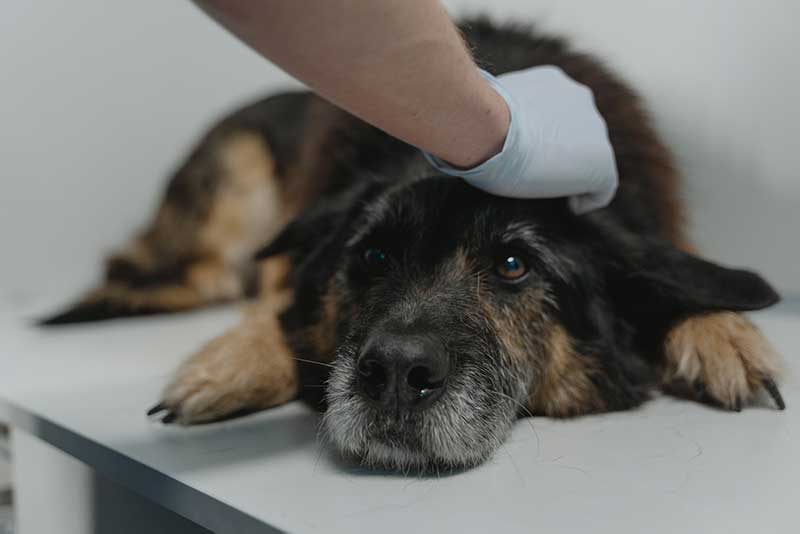Dog Died After Bladder Stone Surgery – Why? Success Rate, Recovery Time, And Side Effects
Dogs rarely get sick if you keep them on a healthy diet with good exercise. But when they do, it makes us super sad.
Sometimes, the dog will recover quickly, while some illnesses can threaten the dog’s life. One of such is the stones in the bladder, which in most cases requires surgery.
So, is bladder stone surgery safe for dogs? If your dog died after bladder stone surgery, you might be worried and wondered what happened. Now with modern science, the risk of this surgery is minimal. The bladder is a fast-recovering organ so that the pet can get back to normal quickly after the surgery. But unfortunately, even though the risk is minimal, it’s not 100% safe all the time.
Once you finish reading this post, you will get to know the success rate of blagger stone surgery in dogs, recovery time, and side effects of dog’s blagger stone surgeries. So, stay tuned!
Is bladder stone surgery safe for dogs?
When someone undergoes surgery, it will create an internal wound. Unlike the scars we get daily, it’s hard to inspect surgery wounds 24/7. So, we don’t know how well the injury is healing up.
With modern medicine, many surgeries have minimal risk involved. So mainly, undergoing surgery is safe. The bladder is an organ with a rapid recovery rate; therefore, a bladder stone surgery performed on a dog is as safe as it is for a human.
But no one can guarantee a 100% success rate. So, if a misfortune happens, there can be complications.
For a bladder surgery to be 100% successful, the doctor and you should be cautious and take good care of your dog. Because the bladder deals with urine, your dog can quickly catch an infection.
So, when the doctor discharges your furry friend after the surgery, you need to take excellent care of him. But overall, bladder stone surgery, also known as cystotomy, is not a very dangerous operation.
But if you’re reading this article, your doggo must have passed away. We’re very sorry for your loss, and we understand your sorrow.
That’s why we decided to give you some closure on why that happened and an overall view on the surgery with this discussion.
Dog’s bladder stone surgery Success rate, Recovery time, and Side effects
The surgeon should remove all the bladder stones and flush out any residue and remaining debris to have a successful bladder stone removal surgery.
Let us break down the factors that affect a successful surgery.
Success rate of a dog’s bladder stone surgery
- Proper diagnosis and prognosis
The first thing a doctor does is prognose the medical condition—an accurate prognosis results in early diagnosis of the illness.
If the prognosis is inaccurate, the doctor will prescribe the wrong medicine, and it’s not hard to imagine everything that could go wrong from there.
Early diagnosis of bladder stones will help cure the illness without complications.
- A well-done surgery
All stones from the bladder and flushing any residue is mandatory to prevent stones reformation.
With the new medical practice of percutaneous cystolithotomy (PCCL), cystoscopy will examine the insides of the bladder after the surgery. It has increased the success rate to 96% from 80%.
- Identifying the reason behind the stone formation
After the bladder stone surgery, the laboratory will examine the sample stone. This analysis will find the cause of the stone’s formation.
It’s essential to determine the treatments after the operation to prevent the reformation of stones. After a proper analysis, the vet can prescribe efficient and effective treatments for the long run.
- Good care after surgery
The bladder is the organ that stores urine until it’s released. So, there’s a high chance of catching infections.
If you do not keep the dog and the surgical wound clean, it can get infected, giving birth to dangerous bacteria.
These bacteria can diffuse the acidity that dissolves minerals and other components that cause stones. Minerals will start depositing and clotting up when the acidic levels dropdown.
Keep the wound clean, and don’t miss any medicines. The sanity of your dog is in your hands.
Recovery time of bladder stone surgery in a dog
Again, the bladder recovers very quickly. Unless your dog faces issues post-surgery, your dear friend will be healed back to his old self within 2 – 4 weeks.
Side effects of a bladder stone operation
Side effects are not uncommon after a bladder stone surgery. A dog might get infections, pain, and even urine leakage.
A doctor usually pre-prescribes antibiotics to prevent bacterial developments that infect the surgical area.
Keeping the wound clean also helps prevent infections. If your dog ever vomits blood and is bleeding through the injury, contact your veterinary ASAP.
The dog will be under anesthetic to stop him from moving around in pain. But anesthesia can cause respiratory and circulatory depression, slowing down the heart rate and breathing.
These effects can lead to respiratory/cardiac arrest, especially if your dog has reached adulthood and is over ten years of age.
Also, the dog will urinate more than usual. He won’t be able to hold it in; he will eventually have urine leakage.
But this mainly happens with the pain associated with the surgery and will come back to normal after recovery.
How long can a dog live after bladder surgery?
If the dog had to undergo surgery because of bladder cancer, it would limit his life. While he can enjoy life up to 12 more months with treatment, it will be cut in half without regular medication.
But that’s for bladder cancer. After a bladder stone surgery, your dog can live life normally if no more complications arise.
Make sure you’re following a proper diet plan and have regular checkups.
Why did my dog die after bladder stone surgery?
So, finally, we get to the elephant in the room.
While this surgery is not a very dangerous one, there have been deaths amongst dogs. A mistake of the veterinary, cardiac, or respiratory arrest led by anesthesia or late diagnosis can cause death. It might be hard to save him in these situations.
Sometimes internal bleeding and swelling are also common. Keep a strict eye on your dog and his behavior during the first 72 hours after the surgery. And if you ever notice something out of the ordinary, rush to your doctor immediately.
Also, we should mention that age and physical wellbeing also plays a heavy part in mortality after surgery. Ensure that the surgery is the only option available to remove the stones, especially if your dog is old and weak.
Doctors can dissolve the rocks away using the medicine if diagnosed early and the stones are still small.
Even if the surgery went smoothly according to the plan, your dog could lose his life due to infections. In this case, contact a doctor immediately if you notice unbearable pain in the dog or vomiting blood. Swelling and discoloration around the incision area are some other symptoms.
If you lost your much-loved pet, it might give you a small rest to know that your fluffy friend is no longer in excruciating pain since stones in the bladder are very painful. We’re so very sorry for your loss.
Stay tuned with Jack Russell Owner for more interesting posts about your favorite dog breed. I’ll see you next time.








